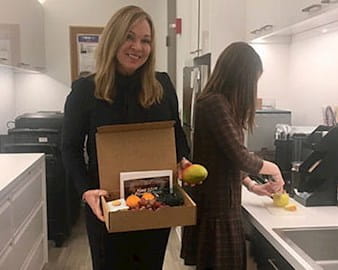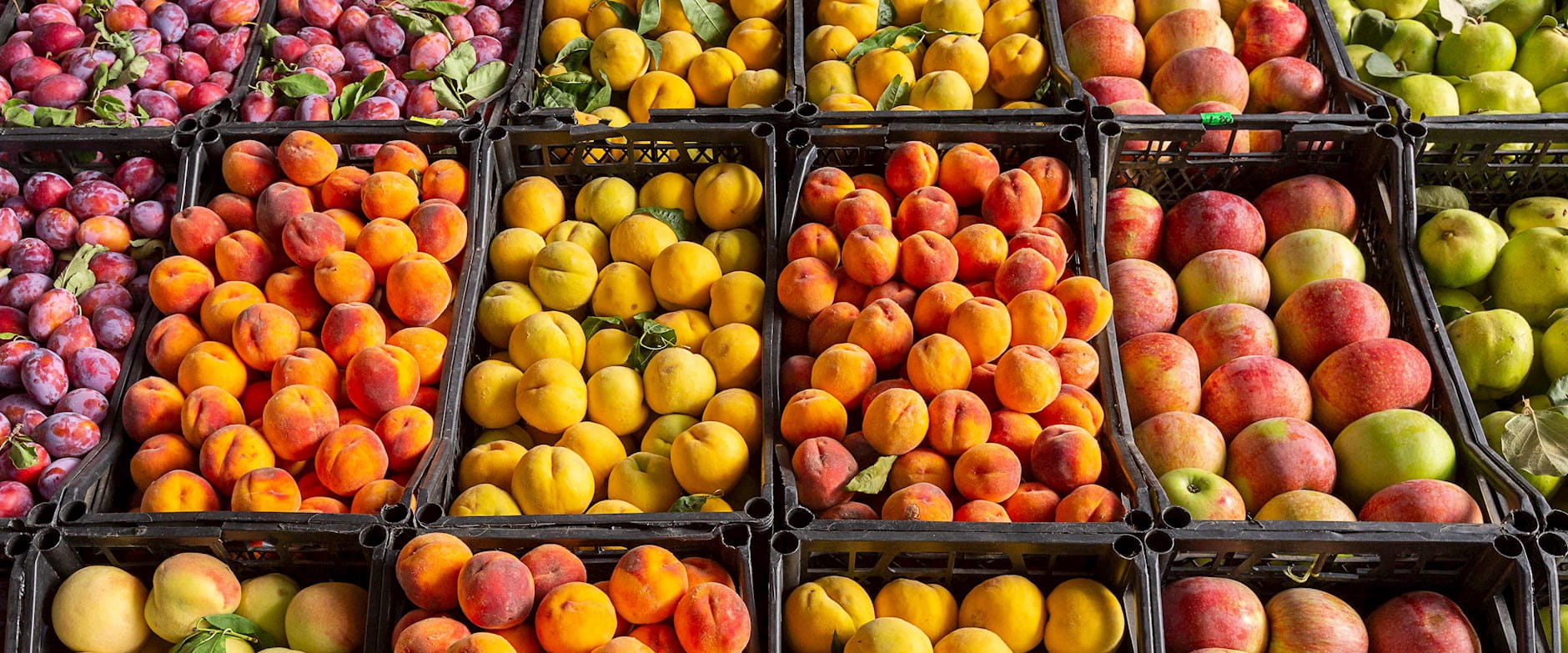Chicago-based startup KitcheNet is embarking on a new challenge in 2019. The startup, which earned third place in the 2016 John Edwardson, ’72, Social New Venture Challenge (SNVC), hopes to eradicate food deserts by building happier and healthier offices.
KitcheNet’s new model differs from when the startup competed in the SNVC, the social impact track of the University of Chicago’s nationally ranked Edward L. Kaplan, ’71, New Venture Challenge, run by Booth’s Rustandy Center for Social Sector Innovation and the Polsky Center for Entrepreneurship and Innovation.
Founder Trista Li, MBA ’18, MPP ’18, hopes the “fruit as a service” model will be a game changer.
“We will continue to increase fresh food access in the underserved community,” Li said. “Instead of offering weekly grocery box subscriptions, KitcheNet is bringing healthier snacks to offices, and those offices help subsidize pop-up farmers markets in Chicago communities. One month of office fruit subscription service could support one fresh pop-up market, create two part-time jobs for local youth, and increase opportunity to 500-plus families to get affordable, quality, fresh food.”
KitcheNet is working with local businesses that are also passionate about healthy eating and food justice, especially those that employ millennial workers. Some partners in this effort include LeoBurnett, RxBar, Tovala, Regus, 1871, MATTER, and Hines Interests Limited Partnership.
At KitcheNet, Li said eating fresh, healthy food is more than a New Year’s resolution—it should be easy (and fun). Li recently sat down with the Rustandy Center to share key takeaways from 2018 and what Chicagoans can expect from the startup and its “fruit as a service” model in 2019.
Improving Office Health and Culture
In 2018, KitcheNet extensively researched the unhealthy effects of “office snacking,” which typically includes eating unhealthy food options such as free pizza, potato chips, and doughnuts. According to the Center for Disease Control and Prevention, only 1 in 10 Americans eat enough fruits and veggies. The research shows that, on average, American workers sneak in about 1,300 calories per week from foods and beverages they got at work. To combat this, KitcheNet designed a fruit subscription service and program that educates employees about their eating habits and presents healthy fruit alternatives.
Expanding Fresh Fruit Access
The KitcheNet team believes families want flexibility, affordability, and proximity when it comes to healthy food options. Switching to the pop-up market could help more families pay for the product they want. These markets are subsidized through the office fruit service and tasting events, which feature dragon fruit, lychee, and more. KitcheNet is also exploring collaborations and partnerships with the Greater Chicago Food Depository, and the American Heart Association.
Reducing Food Waste

KitcheNet wants to do more than just fruit delivery; it sources local produce and creates jobs. KitcheNet collects 50 percent of the delivery fee ($4 per week) to pay local farmers for delivery and also educates corporate offices about where the food comes from and how to prepare it. Under the “fruit as a service” model, KitcheNet offers quarterly on-site fruit tasting demonstrations and recipes to encourage employees to consume leftover fruit by making smoothies, offering pairings, etc. KitcheNet also adjusts the amount or type of fruit in future deliveries. Founders believe this holistic approach sets KitcheNet apart from other produce delivery companies.
Receiving Recognition
In October 2018, KitcheNet participated in the Clinton Global Initiative University, which brought together over 1,000 undergraduate and graduate students to meet with topic experts, academic leaders, and other influential voices to the University of Chicago. A month later, KitcheNet earned the Delta Institute BOOST Award, a crowd-funded pitch fest that seeks to solve complex environmental challenges around the Midwest.
To learn more about KitcheNet, follow the startup on Facebook or visit their website.
If you'd like to receive updates on social impact stories, events, and research at Chicago Booth, sign up for the Rustandy Center's newsletter. Note: We want to demonstrate our commitment to your privacy. You can review Chicago Booth’s privacy notice for more information.


